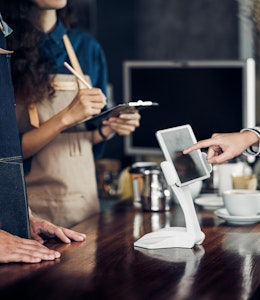What to do if a Customer has an Allergic Reaction to your food: Part 2

The best laid plans…you’ve clearly communicated and displayed all of your allergen information across your menus and around your business, you’ve followed guidance and implemented procedures in your kitchen to avoid cross-contamination, you’ve briefed your staff thoroughly… and then the worst happens and someone suffers an allergic reaction to one of your dishes.
Sometimes no matter how well prepared we are an accident might happen. It might not even be any fault on your business, and that the customer has misunderstood or miscommunicated something.
What can you do?
You can be prepared for the worst and know the best way to deal with it.
Would you and your staff know what to do and what steps to take should a customer suffer an allergic reaction?
If not, don't worry, we’re here to help. In this special series we speak to a number of foodservice and allergy experts about how Caterers can best respond and react to an allergic reaction in their business.
Last time Food Allergy Aware’s Caroline Benjamin shared her insight.
To read the full "What to do if your customer has an allergic reaction" guide, click here.
Now meet our latest contributor…
Ruth Holroyd, founder of What Allergy blog
Ruth Holroyd is the author of The Reluctant Allergy Expert and the award winning ‘What Allergy’ blog, an award winning blog covering topics related to allergies, eczema and asthma. She’s also a Free From Food Awards Judge and has worked with The Allergy Show, Foods Matter, BSACI the National Eczema Society, and the BBC and ITV.

“It’s every chef or waiter’s worst nightmare. ‘I think I’m having an allergic reaction!’ As an allergic diner who has been sitting at the table feeling the onset of an allergic reaction on a number of occasions, I’ve seen different ways of dealing with the situation. I know it’s terrifying from both sides but handling it correctly can have a significant impact for all concerned. At this point, it’s just about the person having the reaction and getting the best outcome for them.
Ruth shares her invaluable advice with us:
What to do if you are the food business where someone is having an allergic reaction:
- Call 999 – Do this before anything else. If you have enough staff, have someone sit with the person and their family. Talk to them, keep them informed. Let them know you are doing everything you can to find out what happened.
- Stay calm and inject adrenaline - Ask them if they carry adrenaline and whether they have used it yet. They may be confused and scared and not be acting rationally. If they are on their own, they may need you to step in and encourage them to use their adrenaline to be on the safe side. If the adrenaline does not appear to work, encourage them to inject their second pen, if they have one, into the other leg! This is better for getting the medication into the system.
- Keep them seated - Never let the person walk. Don’t move them, tell them to stay calm, sitting where they are. Walking can make a reaction worse. Paramedics should not get the patient to walk, a wheelchair or stretcher would be preferable.
- Find out what happened - If they are with friends or family, you can start to calmly understand what has happened. If you don’t already know, find out what they are allergic to and note this down. They may know what they think the person has reacted to.
- Keep the evidence - Make sure you have the plate of food and isolate it in case you need it for testing.
- Take notes - Note times, symptoms, names of who is there. Talk to the person if they can speak. Check how they are feeling regularly so you can give this information to the paramedics when they arrive.
- Get the contact details - In my experience this rarely happens. It would make such a huge difference to me if it did. Regardless of where the blame lies, a simple email or text message to say you are thinking about them, and hope they recover swiftly and are okay would be a very kind thing to do. Maybe that’s not advised in these situations for legal reasons as it’s never happened to me, but I’ve often thought it would be a good thing.
- Debrief ASAP - When the person has gone to hospital or safely home, speak to all staff who were involved as quickly as possible to work out what happened. The sooner this is done the better as people forget, especially if they are worried they made a mistake. Make it clear this isn’t about blame but learning and improving procedures after mistakes are made.

What do if you are experiencing an allergic reaction in a food establishment:
If you have allergies the chances are this has happened to you. The worst reaction I had was also the one where the staff showed no compassion or care. I think that was because of a lack of training and confidence to deal with the situation but it left me feeling ignored, disrespected, angry and very disappointed.
Here are few things you should do:
- Evidence - Always take a photograph of your food before you start eating. Not so you can post it on Twitter, but so you can remember what you ate and see what it looked like, it might help when trying to work out what caused a reaction.
- Always inject - If in doubt, inject your adrenaline. You won’t do any harm in doing this and it could save your life.
- I have an Allergy Action Plan with me at all times. This is a document that details what my reactions look like for me, my common symptoms and what medication I have with me. It talks the person through how to handle the reaction so it can be helpful.
- Engage staff - Right from the start of booking I try to make myself seem as human, normal and reasonable as I can. I will always contact a restaurant beforehand and also visit in person too before going. I want them to engage with me as a person, to understand my fears and allergies and to care about helping me.
- Stay calm - Stay seated, do not move! This is so important. You should not get up and walk if you are having an anaphylactic reaction. It can make things speed up and lead to a worse reaction.
- Take photos of your reactions - Any swelling, rashes etc. And make notes of the time you started to react, the time passed, what you think you reacted to. Even really basic notes made at the time can be so helpful as you may not remember after a reaction. I find I have a lot of brain fog after an anaphylactic reaction and often remember very little. Having photographs will show you what time things were happening.
- Get tests - If you go to hospital, ask them to test for the suspected allergen. These tests are sometimes not done and they can be really helpful for you in understanding and unpicking what went wrong. It can be a new allergy or an allergy that has worsened with time. If you don’t test you can never be sure.
The conclusion
It takes courage to put your trust in a restaurant and its staff, but we both want the same outcome. The restaurant wants every customer to enjoy the experience and return and the allergic person wants to have a safe meal with the minimum of fuss. So when things go wrong the same applies. Be kind, be calm and act fast! Both the restaurant and the diner have a responsibility to be open, honest and up front. When we can all see allergies as just a normal part of the job I really believe it will get easier to avoid mistakes, on both sides.”
Visit Ruth’s blog What Allergy, here and discover more about her book The Reluctant Allergy Expert, here.

How Erudus can help you manage allergens
It’s our goal to make adapting challenges and new legislation in the foodservice industry as easy and efficient as possible. That’s why we’ve created a selection of tools and solutions to help Caterers (and Retailers) manage and communicate the allergen content of their products.
Our Recipe Builder allows you to instantly find allergen information for a single ingredient, or view the aggregated allergen summary for an entire recipe.
Our Allergen and Nutritional Search provides essential allergen and nutritional information across tens of thousands of products, directly from the Manufacturer.
And you can find out more about how Erudus can help Caterers here.
Next time we chat with Lindiwe Lewis, creator of The Allergy Table blog about her experiences with handling her allergies and her advice for Caterers and Food Establishments on how they deal with the situation calmly and effectively...
You may also be interested in…


You may also be interested in…


